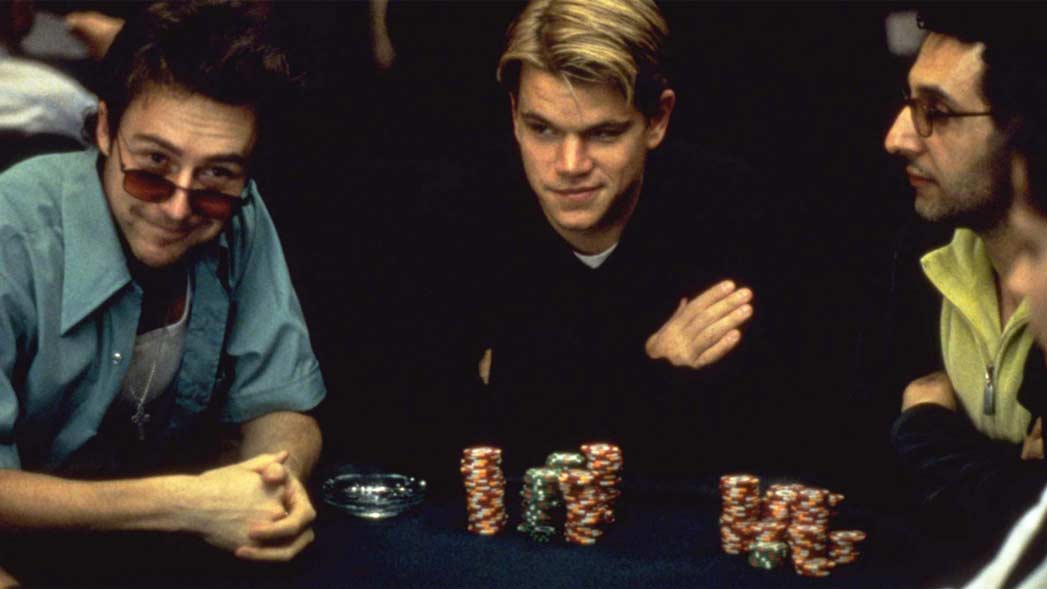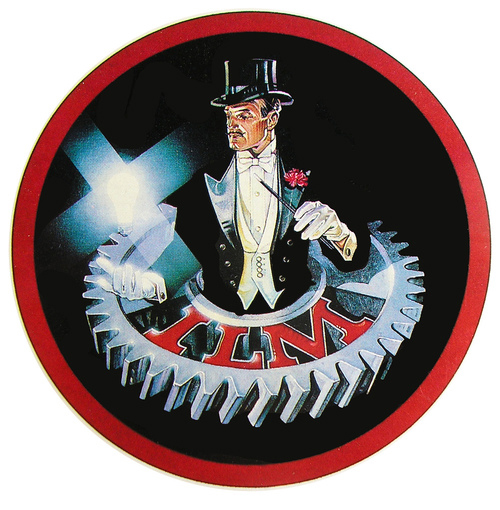I play a little poker but by no means do I have much skill at it, the card game that is. I do however absolutely love poker as a metaphor for life, as every hand played, or not played, and every gesture symbolic with some corollary in the circumstance of our lives. The movie “Rounders” with Ed Norton and Matt Damon was really interesting in that the two actors spent a good time researching the nuances of professional ‘rounders’ poker players who scratch up a precarious living jumping from one card game to another emptying the pockets of unsuspecting naive players with a dizzying variety of skill and subterfuge).

The thing about poker, and life for that matter, is that there is always simultaneous to what your perceiving, a bigger game being played. And if your unaware of “that” game, your the one being played ! In the movie Rounders there’s a bunch of great lines read as narration to provide the audience insight to the scenes being presented to them, here a few … “Listen, here’s the thing. If you can’t spot the sucker in your first half hour at the table, then you are the sucker.” And along those lines “It’s immoral to let a sucker keep his money”. One I particularly love, Matt Damon’s character jokes about how the Rounders sometimes team up on unsuspecting lesser players, “We’re not playing together. But then again, we’re not playing against each other either. It’s like the Nature Channel. You don’t see piranhas eating each other, do you ?”.

Where I’m going with all that Rounders jazz is this, that most people think they have a good line on their skill and value within the market they serve. To put another way, most know the job their doing, and believe they know how much others get paid and thus what they can expect for their work. Now maybe since I’ve spent so much time around artists who think little about business, I have a slightly slanted view on all this, but I don’t think so. There are some basic and common misperceptions as to the value people truly have in whichever market they serve. Even that notion, “the market they serve”, might sound odd to some, thinking they are bringing value to the deal, and are selling their considerable skill to those who need it. In my opinion this isn’t incorrect, its just missing the bigger picture entirely !

It the illusion of inherent worth, the thinking that you have intrinsic value regardless of what’s happening on a ‘market level’. Going back to Rounders for a bit here, if you don’t see the big game, which is the market your working in, than your missing the big picture. The big game (industry or market), is like a group of poker players all with different hands full of cards, and you are but one of them with only your own hand. How can you possibly know your value at the table when you can but see only your own cards ?! You can’t, and thus you have no intrinsic value, and are subject to the vagaries of the game (your market trends). Enough of that, now I’ll jump into my story.

Awhile back I ran a small VFX and Animation studio called Curv Studios in San Francisco. I had a 900 square foot office space with about 18 computers, and only one loyal full time employee, my brother Jordan. I’d always hustled up work throughout my life and this entrepreneurial venture was just like any other one, I hit the pavement selling our services and would come back to the studio with all manner of jobs from game cinematics, logo animations, corporate communications, films, commercials, signs, anything to keep the lights on and doors open. Some quarter million dollar contracts came through and we were high on the hog ramped up with a staff of 15, crammed in our space and spilling over with remote artists. Sometimes we had a $5k contract to split between 5 of us for 3 months, and pay for the office space of course…and times were very lean. I had situated Curv within 3 blocks of ILM (George

Lucas’s Industrial Light & Magic, the seminal visual effects film production company responsible for Star Wars and possibly 50% of every exciting movie from all of our childhoods), in hopes that by some osmosis I would eventually get spill over work from them directly, or indirectly. In the beginning I was simply graced by a variety of ILM and other bay area artists who graced Curv with their skill and expertise on Curv jobs I had brought in.

Over time I noticed something quite odd, that some of the artists from the bigger established studios had a warped sense of entitlement and distorted sense of value. Now this is not to say they weren’t skilled, they most certainly were, yet their skill was in the craft with little or no conception of what financial value their skill was worth ‘on the street’, and really in any context other than at the studios which they had worked. This may make sense, of course one gathers their comprehension of value from what they were getting paid prior, right ? Well it does and it doesn’t, its correct that one would make that knee-jerk conclusion about themselves without looking any deeper, but its not really correct as those companies have multi-million dollar infrastructures and slates of films for years going forward. An artist’s value in “that” environment is based on where their slotted in the assembly line and the value “that” company places on their position within. Thats not “the game”, that’s only one hand of cards. The game is being played by everyone in every studio, and every freelancer on the street, basically everyone who sells their services in that market. To only perceive your value in the isolated context of the studio within which you work, and then to leave it and expect “that” value to correspond everywhere, is a misinterpretation of the bigger game being played. However it quickly became clear to the film craftsmen who worked at Curv that their value was based not on the “rate” they had enjoyed prior, but on what I was able to pay them based on the profits I procured from the work I sold and produced.

We had a huge contract (for Curv that is) from Maxis who was creating the PC game “Simcity4”. I hired about 15 modeling and texture artists to create 3D buildings for the game. Every day for almost 7 months our fax machine would ring and 2-3 page documents would pour through. On them would be several reference photos and descriptions of an asset (building or prop) Maxis needed to create for their game, along with a price. Lets say one building was $2,400 and I’d go to an available artist (all of them had 2-4 buildings already assigned to them) and ask if they wanted to take it on. I’d tell the artist what percentage of that job they would be paid and they’d get to work, or they would complain that they weren’t able to get “their rate” and it was unfair. At which point I’d reply, “what rate? here is the job, you can see the total, the studio gets X percentage and you get Y, and whenever you finish it you get paid … its a finite amount of profit for you and the studio. If you work faster you can make even more.” I was essentially treating the artists as independent contractors, which is essentially what they were as freelancers, and giving them a cut of each job. Jordan, who was and probably still is an insomniac cleaned house, working through the night and finishing many buildings (contracts) in a quarter the time of the seasoned artists from ILM. He was making on average 4-5 times their “rate” ironically. More times than not the “seasoned” artists would get upset and I’d take them for a walk around the block to give the “Illusion of inherent worth” speech, much to the dismay of Jordan who knew then this was illadvised. I was a little rougher around the edges then, then… My point was, regardless of how well it was received or not, was that they had an added incentive to make an even higher rate than they could at ILM if they innovated quicker more efficient means of producing the work, like Jordan had. This is impossible at larger companies who set “your rate” and no matter how efficient you are, you get paid the same. It is the company that profits when you work faster, not you !

So in this case as in many at Curv, the kid fresh out of school, actually no, the kid (Jordan) who learned on the job was making more than decades old veterans of ILM. Why, because he understood his value in the market better than they, and adapted to it. Believe it, Jordan would do laborious processes and get them done much faster than the “experts” that spent all that time trying to devise a smarter, more elegant procedural way to do the same thing. Meanwhile Jordan was on his 3rd job and they were still on their first, and Jordan had cashed 2 checks already ! Oh, and his work was very well received by our client.

When I was younger I used to work for a loan shark who lent my friend and I money to buy concert tickets. I recall him giving us $15,000 for one concert, we went and bought the tickets, then the broker who had agreed beforehand to give him $10 over on each ticket, reneged on the deal leaving him with a stack of tickets. As the concert date approached he found he couldn’t sell over 50% of the tickets and was looking at a big loss. So he asked if we would go down to Richmond, VA and sell them on the street and recoup whatever we could, and take a cut we felt was appropriate for our troubles, but not too much or else !

We spent a weekend at a Grateful Dead show selling tickets for food, for cash, for other, at all different amounts (whatever the person could pay was better than nothing), and would go back to our hotel with wads of cash to dump off, then head back to the arena. In the end we extracted our take and had sold all but 20 or so tickets (over 90% of them, tickets were cheap 30 years ago !). The point of that story is this, value is determined by those willing to pay for a product or service, not by those selling them.

To put that last statement in better context, one last story I’ll tell. My daughter Lily put up a lemonade stand at the end of our driveway with her friend Nora. They purchase the lemonade powder mix, brought out a little table, glasses and a pitcher. They made a profit over their cost in materials (their overhead), and then at the end of a hot day my daughter turns to me to reflect, “Daddy, its seems that if nobody is there on the street to buy my lemonade I won’t make any money. If there were more people out today I’d have made a lot more.” To this I replied, “Yes that’s the way it is, the money you make comes only from those who are around and willing to pay, not by what you ‘think’ you should make”. Lily just shrugged uninterested, “Yeah well, I also just gave away drinks to a few kids who didn’t have any money but looked thirsty. So I guess I made even less.”

